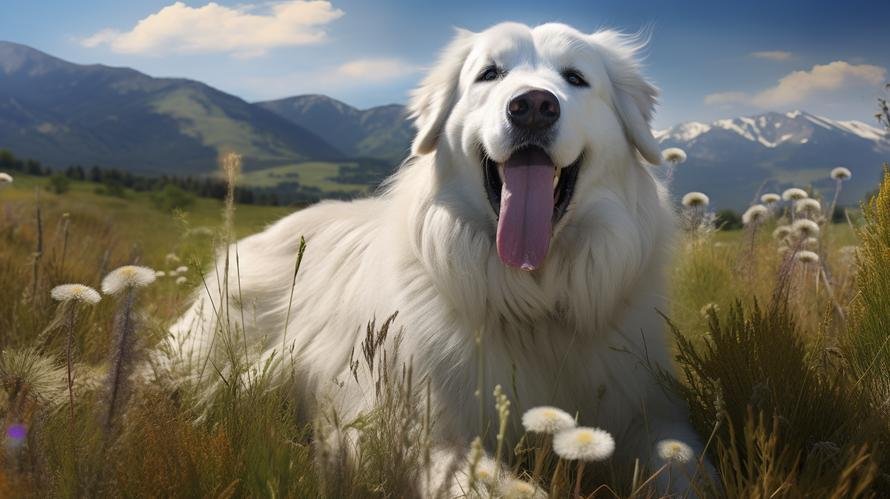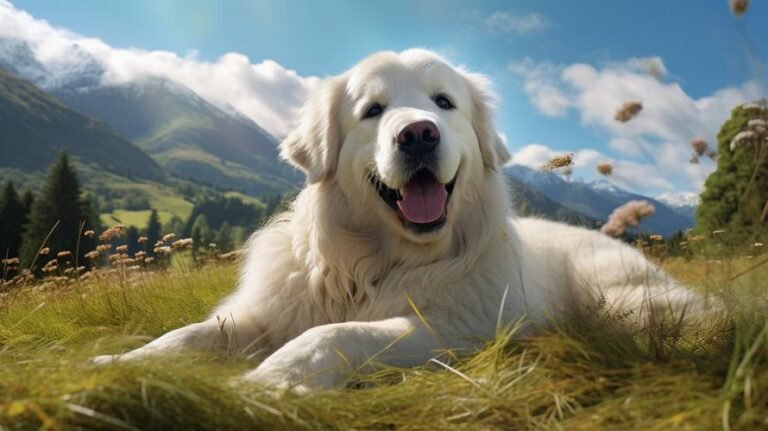Have you ever heard of the Pyrenean Mountain Dog—or the Great Pyrenees as it’s more commonly called? No, it’s not a type of mountain or a cheese. It’s actually a beautiful and majestic breed of dog that’s often compared to a teddy bear for its friendly demeanor and fluffy white coat. Now, you may be wondering, “Is this bear-like creature as brainy as it is brawny?”
Surprisingly, they are.
That’s right, the Great Pyrenees are not only beautiful but intelligent dogs too. These gentle giants have been serving as loyal companions to humans for centuries. Originating from the Pyrenees Mountains that stretch along the border of France and Spain, these dogs have been bred to guard livestock from predators – a demanding job that requires quick thinking, keen observation, and unwavering courage.
But, defining a dog’s intelligence isn’t as simple as doing well in school or scoring high on an IQ test. Part of understanding the brilliance of a Great Pyrenees comes in appreciating the type of intelligence that they shine in.
The Canine Intelligence Spectrum
Just like humans, dogs exhibit various types of intelligence. Dr. Stanley Coren, a renowned professor of psychology at the University of British Columbia, identified three kinds of intelligence in dogs—instinctive intelligence, adaptive intelligence, and working or obedience intelligence.
Instinctive Intelligence refers to the skills that a dog was bred for. For instance, herding dogs are naturally adept at controlling the movement of other animals—their intelligence lies in their ability to perform these tasks without extensive training. On the other hand, Adaptive Intelligence is reflected in a dog’s problem-solving capabilities or how well they can learn from previous experiences.
Now, most people, when considering a dog’s intelligence, think of Working or Obedience Intelligence – such as following commands or learning tricks. This is where some may argue the Great Pyrenees fall short. However, what they consider disobedience could simply be the display of the third type of intelligence. Let me explain.
Work Smarter, Not Harder
Ever heard the saying, “work smarter, not harder”? That’s the mantra the Great Pyrenees live by. Although they may seem disobedient to some, their apparent reluctance to follow commands instantly is, in fact, a testament to their intelligence.
This breed doesn’t merely obey because you’ve given a command. Instead, they process the command, evaluate the situation, and then act on it—if they deem it logical. This is an instinct inherited from thousands of years of working independently in the mountains. ‘Do as told without question’ is not part of the Great Pyrenees’s work ethic and it’s far from a sign of low intelligence. Instead, it’s a mark of adaptive intelligence and a trait we can learn much from.
So, when you’re teaching your Pyrenees new tricks, remember, they’re not disobedient—they’re merely thinking hounds. Consider rewarding them more frequently or try incorporating the commands into a real-world scenario that makes sense to them. For instance, training them with commands related to guarding or patrolling could get you better results.
The Noble Guard
Speaking of guarding, let’s not forget why they were originally bred—to guard livestock from predators. This would not be possible if the Great Pyrenees weren’t blessed with an above-average instinctive intelligence. Their ability to sense potential danger from miles away, stay vigilant throughout the night, and bravely defend their charges—be it sheep or humans—is proof of their cognitive prowess.
Their instinctive intelligence also leads to their strong sense of independence. They are bred to make decisions and act on their own. This also means they are less likely to suffer from separation anxiety, making them a good choice for working families.
To Wrap It Up…
So, is a Great Pyrenees a smart dog? Absolutely! They’re thinking dogs, not just obedient dogs. They were bred to make important decisions under pressure and they still carry that ability today. They’re courageous, independent, and incredibly observant, embodying the perfect blend of instinctive and adaptive intelligence.
Does that mean training them will be a walk in the park? Not necessarily. Their intelligence comes with a thirst for independence, meaning you might need a bit more patience and creativity to make them see the logic behind your commands. But, once you understand and appreciate their unique type of intelligence, you’ll find that these gentle giants can indeed be the smart and faithful companions you desire.
Remember – Every dog can be a smart dog, but it takes an intelligent owner to see their brilliance. Don’t measure your Great Pyrenees’s intelligence only on obedience. Dig deeper into their problem-solving abilities, consider their history, understand their natural instincts, and remember to be patient. Because, behind that fluffy, teddy bear-like exterior lies a mind that, given the right stimulation and understanding, will surprise you time and time again with its intelligence and loyalty.
And hey, before you go, let me leave you with a bit of trivia. Did you know that the Great Pyrenees is the royal dog of France? That’s right! King Louis XIV proclaimed it the Royal Dog of France in the 17th century. So, not only do you have a smart dog when you have a Great Pyrenees, but you also have a royal one! So, go ahead, lay out the red carpet for these “Lion Kings” of the Mountains!



